How to Develop a Real Estate Platform?
When was the last time you were looking for a quiet place to take a rest? Was it the quick look at Airbnb options in a two-hour drive from town by the beach? Or maybe you are about to make one of the biggest decisions in your life — to purchase the house of all American dreams on Zillow? Trends rise and fall, but eternal things like the real estate industry will probably never leave us. Meanwhile, the whole world is getting used to crazy AI stuff and digitalized reality surrounding us, but some niches are still lacking tech innovations. If you think that the real estate industry was long ago occupied by giants like Zillow and Redfin, devabit will prove you wrong! Below, we have given an ultimate guide on how to develop a real estate platform in 2025 and truly stand out among the competitors, all gathered firsthand by our wolf of Wall Street in the world of web design —Nick Dmytriv. Check on the real estate platform types, unique features, top expert insights, the most frequently asked questions, and monetization strategies as a bonus! Stay with us to discover how to develop a real estate platform that delivers real value.
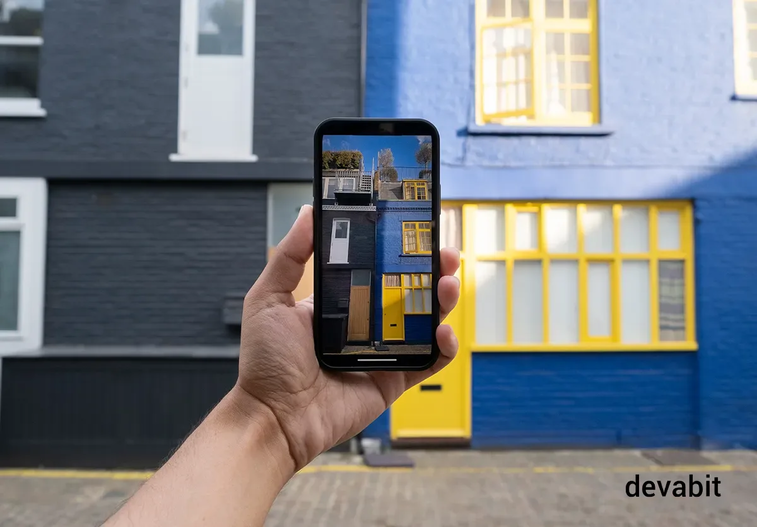
- What Is a Real Estate Platform?
- What Are the Types of Real Estate Platforms?
- Is It Relevant to Build a Real Estate Platform in 2025-2026?
- How to Stand Out among Real Estate Competitors?
- How to Develop a Real Estate Platform?
- Bonus! Monetization Strategies
- FAQs on How to Develop a Real Estate Platform with Nick
- Should I build a niche real estate app for rentals only?
- Can I build a platform like Zillow or Redfin? What do I need to consider?
- How do I differentiate my real estate platform from competitors?
- Should I target one country or go global from the beginning?
- What are the essential features of a real estate app or website?
- How do I add a mortgage calculator to my platform?
- What’s the best way to handle real-time chat between buyers and agents?
- Can I integrate a 3D virtual tour or AR experience for property viewing?
- What tech stack do you recommend for building a real estate platform?
- What database is best for storing property listings and user profiles?
- How do I make sure the platform is scalable as I grow?
- Can I build this as a no-code or low-code MVP first?
- Should I prioritize a mobile app or a responsive website?
- How much will it cost to develop a real estate platform?
- How long does it take to launch an MVP?
- Can I build this with a small team, or do I need a full agency?
- Why Choose devabit?
What Is a Real Estate Platform?
Before diving deep into the complicated aspects of real estate app development, let's start with a groundwork of the industry to help you profoundly understand the ecosystem you plan to build for.
Beginning right from the core, the real estate platform is a digital system, website, or application designed to connect users involved in property transactions, such as buyers, sellers, renters, agents, landlords, and investors, in one unified system built for providing all real estate services "under one roof". But what are the core features of a real estate platform?
The must-have features of a real estate platform usually include:
- Property Search & Filtering;
- User Accounts (buyer/seller/agent/investor);
- Admin Dashboards;
- Property Detail Pages;
- Contact Forms/Chat;
- Map Integration;
- Listing Management;
- Multi-Language Support.
However, the true leaders of real estate have become the leaders as they never limit themselves to basic features. The dedication to solving unique user issues and offering no less unique solutions has paved their highway to niche leadership.
Continuing the topic of niche real estate app development services, we must understand the key differences between real estate solution types to choose the one that best aligns with your business objectives.
What Are the Types of Real Estate Platforms?
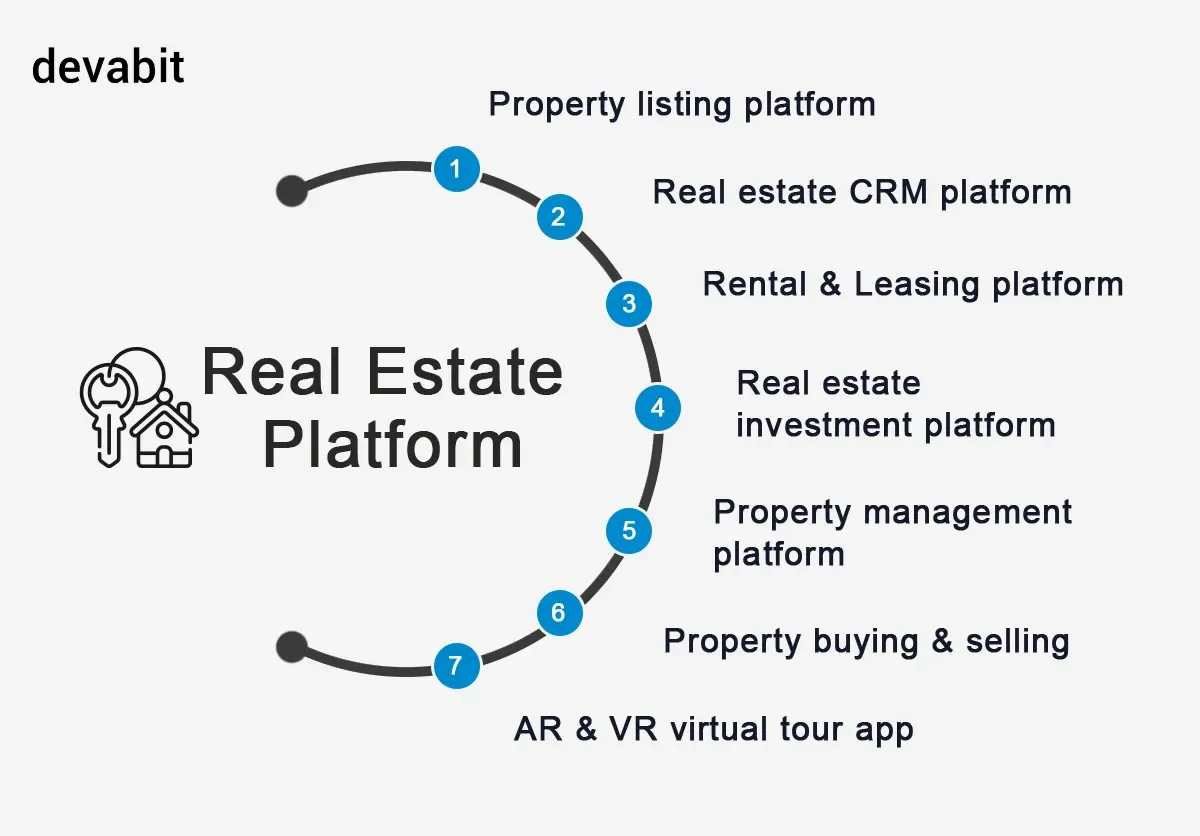
The real estate industry has rapidly evolved from traditional face-to-face property purchasing to booking a flat with a sea view via the no-contact method in the app. If you want to find out how to develop a real estate platform that addresses specific audience demands and sets the trends of digital property purchasing and renting — start with an overlook of real estate platform types:
- Property Listing Platform: a classic real estate listing platform used for browsing, searching, listing, and managing property, typically for sale or rent. Serves as a bridge between buyers, sellers, renters, and agents.
- Real Estate CRM Platform: a customer relationship management platform designed to help real estate professionals manage leads, automate workflows, and streamline interactions. Usually used for centralizing user data.
- Rental & Leasing Platform: helps landlords, renters, property managers, and tenants manage the entire rental lifecycle data. Designed to be an all-in-one communicational platform, often for ensuring a no-contact rental process.
- Real Estate Investment Platform: a digital solution designed to make real estate investment accessible, transparent, and secure. Usually connects asset managers with investors and ensures proactive communication between them.
- Property Management Platform: an all-in-one software solution designed to optimize management processes for landlords, property managers, and real estate companies. PMP combines key features of communication channels, finance management tools, and listing features.
- Property Buying & Selling: a real estate platform or application built to simplify and streamline the property buying and selling process, connecting buyers, sellers, and agents. These platforms are designed to improve the entire transaction process, from property discovery and listing to negotiations, offers, and even legal documentation.
- AR & VR Virtual Tours App: the unique combination of a real estate platform with a distinctive user experience delivered via AR or VR virtual tours aimed to demonstrate a life-like image of a desired property for buyers, renters, or agents. Often used to prompt quick decision-making among users due to a realistic overview experience on their devices.
Before asking how to develop a real estate platform, it is essential to first define whether you plan on building a niche solution or a broad, global product. This decision will shape every aspect of your project, from the core features and UX design to your tech stack, data sources, and even local compliance requirements.
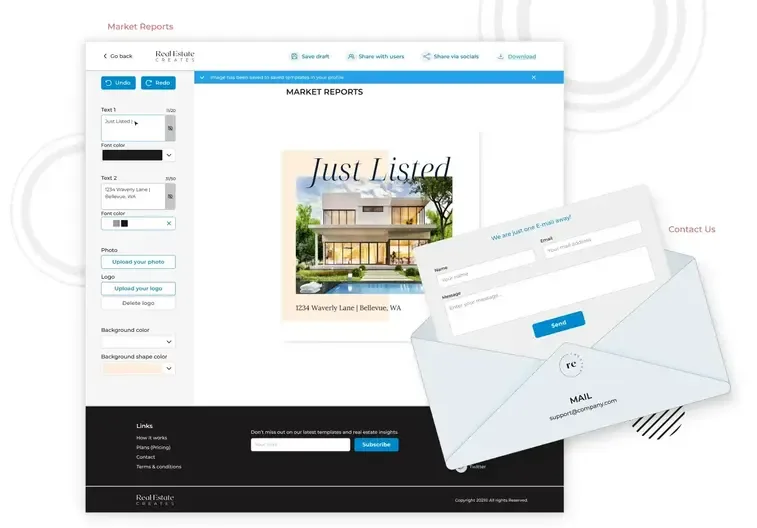
Is It Relevant to Build a Real Estate Platform in 2025-2026?
Even though the past two years were a period of economic hiatus for the real estate industry, results from Deloitte’s 2025 commercial real estate outlook survey give hope for 2025 being the year of a real recovery. And while some think that the niche is already taken, others notice even the most minor gaps to be filled.
How to develop a real estate platform that will succeed in 2025? We think we have the solution. Being ahead of the competitors is not about the most innovative tech stack or copying the estimated leaders in the hope of outpacing them. The honest answer to the "Is it relevant to develop a real estate platform in 2025?" lies in your ability to notice and cover those yet undiscovered gaps via your solution. What if you are about to develop a real estate platform that will solve all the problems of modern industry, deliver an unmatched user experience, and completely digitalize the process of property purchasing? Being the first means being inimitable.
How to Stand Out among Real Estate Competitors?
Getting back to the question of how to develop a real estate platform that can outpace numerous competitors, we must talk about the importance of being unmistakable. You can integrate endless tools, invest everything you have in UI design, and follow a beaten path, but users would still remember only Zillow and Booking. How do you differentiate your real estate platform on the market? Let's put it simply!
Collaborations Power
"When asking how to develop a real estate platform, people usually think of the next-gen tech stack, advanced filtering, or crazy design ideas, but often forget about the collaboration opportunities!" — that is what our top-tier web designer, Nick Dmytriv, said and completely changed the perpective of our project approach.
"Designing the solution with the user in mind is the key to successfully reaching your target audience and satisfying their most unhinged needs. That is why the true leaders in the real estate market are real leaders: they know the secret recipe for user satisfaction."
— Nick, but what if we need to conquer a wider audience's loyalty, not just the buyers or renters? How can we forget about agents, investors, and landlords?
"Eureka!"
And that was the point of no return. Ideas flew one after another, but our dedicated team, led by Nick Dmytriv, has managed to find pure gold among the bronze. Here is how devabit has introduced a unique content creation and distribution platform for a profit-making collaboration with real estate platforms.
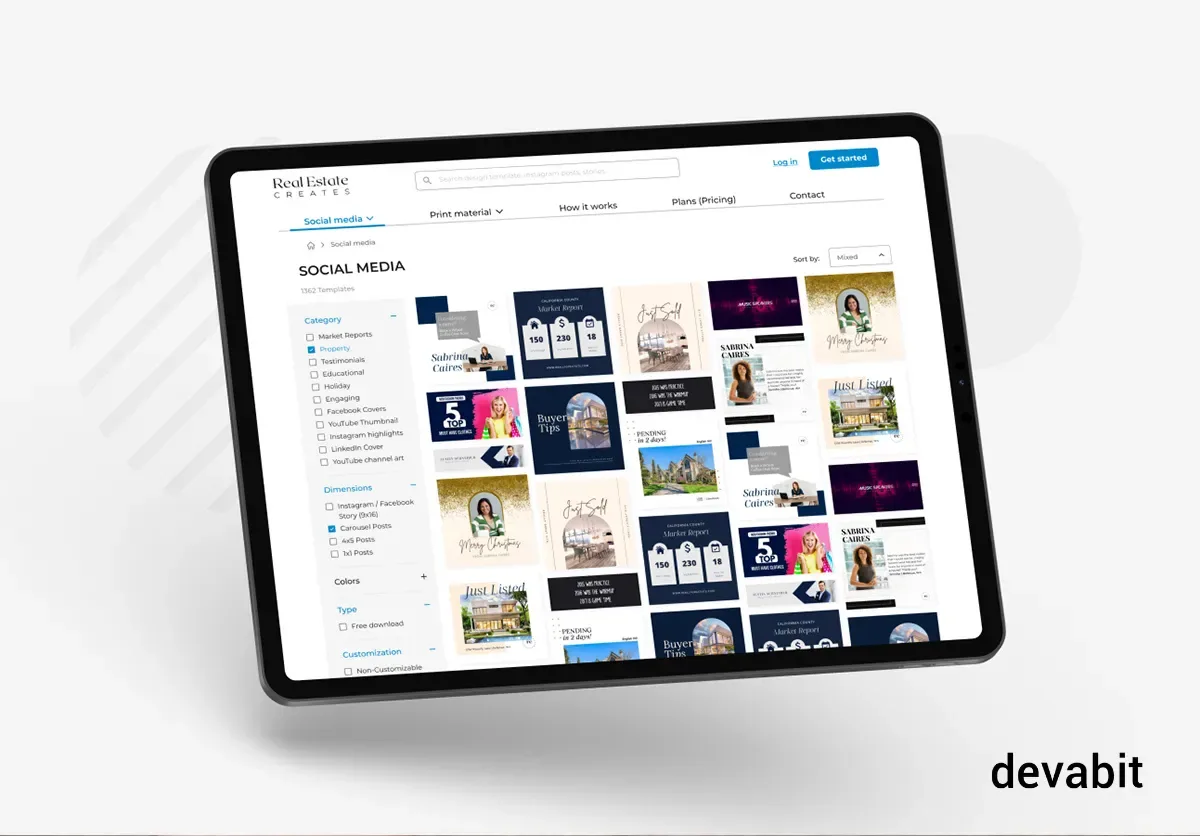
Our client has reached devabit with a solid question, "How to develop a real estate platform?", but we gave them something way more powerful. Our solution is meticulously designed to help agents and people who want to sell or lend their property to promote their content and simplify the statistics tracking over numerous advertising and social network platforms.
After the successful deployment, Nick has given us exclusive insights from the design and development process: "Our solution addresses several pain points at once:
- Helps users create, publish, promote, and track their ad content for property sale or rental;
- Eliminates the urge to use multiple platforms for chatting, content distribution, client seeking, and property management;
- Attracts potential users via a content distribution platform. While agents post property advertising, the buyers can also reach the main real estate platform and explore other options available.
- Creates a unique image of the client's brand on the market by introducing distinctive features, well-structured UI/UX design, and a memorable solution style.
Thus, our solution for a real estate platform not only meets a wider audience's demands but also helps the client differentiate their app from numerous competitors. I'm truly proud of our work, and believe that a personalised approach, pure dedication, and a deep understanding of user demands have contributed way more value than any tech stack we've used."
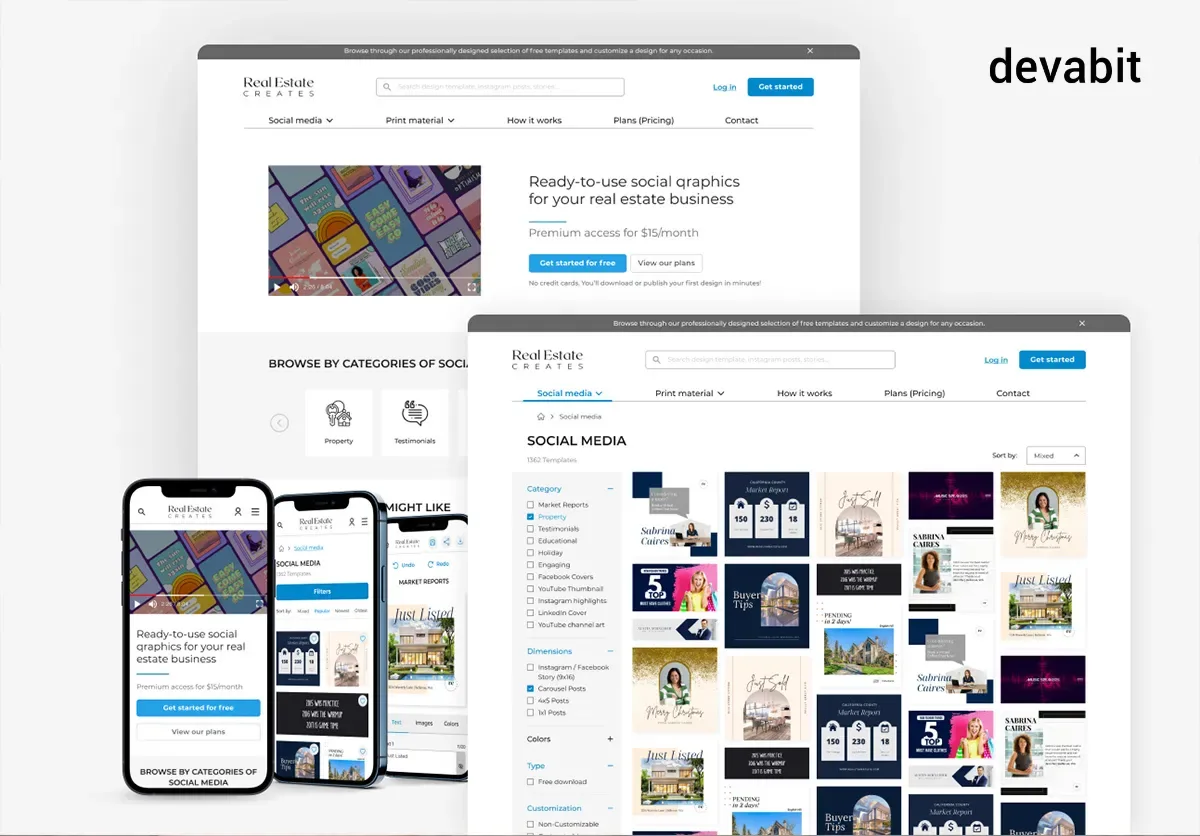
As a bonus, the solution impresses with UI/UX design choices aimed at reaching all age groups and complying with any device. The platform is thought out to the smallest details, from a vast library of digital assets and easy-to-use navigation tools to mobile compatibility and a restrained color palette. Back to the dawn, our client wanted to know how to develop a real estate platform but received our secret sauce to the successful solution lasagna. Want to have a bite? Stay with us!
How to Develop a Real Estate Platform?
And here comes the core of our guide! Now that we know for sure that real estate app development services are worth the investment in 2025 and that the key to being the first is hidden in solving unique user demands, we are all ready to move to the "how to develop a real estate platform?" stage.
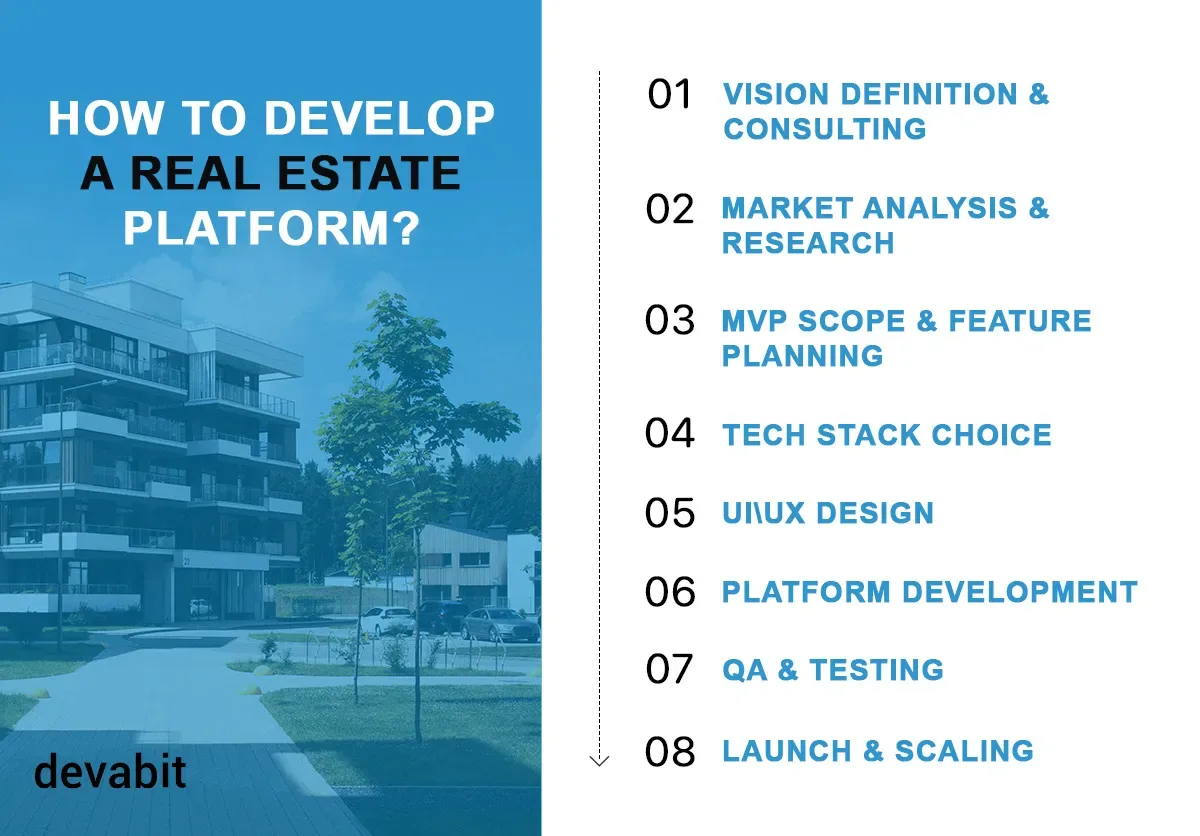
Now let's profoundly discuss every step on your way to a solid real estate solution:
- Vision Definition & Consulting: whether you already have a well-structured plan for your future solution or these are just the thoughts visiting you at night — you should always start with a sharp vision definition and expert consulting if needed. Take your time to dive deep into the industry specifics, uncovered pain points, and opportunities for growth, and see if your concepts comply with them. Meanwhile, solid real estate app development consulting services will give you a clear understanding of the best-in-class tech stack, required team size, and budget scope.
- Market Analysis & Research: As soon as you understand that your idea has future-proof potential, your budget ambitions respond to your timeline opportunities, and you have reached trusted expert advice, it is just time to investigate the market and see which niche is best to choose. Check on the latest niche statistics, main competitors, their weak points, and find out if you are ready to cover them with your newly-come real estate platform.
- MVP Scope & Feature Planning: at this point, the in-house or outsourced development team is getting closely involved to help you build an MVP illustrating the key features you want to see in your real estate platform. Skilled designers and developers must ensure you get a prototype that delivers a life-like user experience so that you get an extensive understanding of what featuring your solution lacks, which ones need adjustments, and which ones are going to be your real wheelhouse.
- Tech Stack Choice: As soon as you are delighted with your real estate platform MVP, you should go on with the top tech stack. Choosing scalable and easy-to-maintain frameworks is essential if you want your solution to stay up-to-date as your business evolves. In addition, rely only on trusted API providers if you plan your real estate platform to have a payment gateway, cloud storage, or VR experiences.
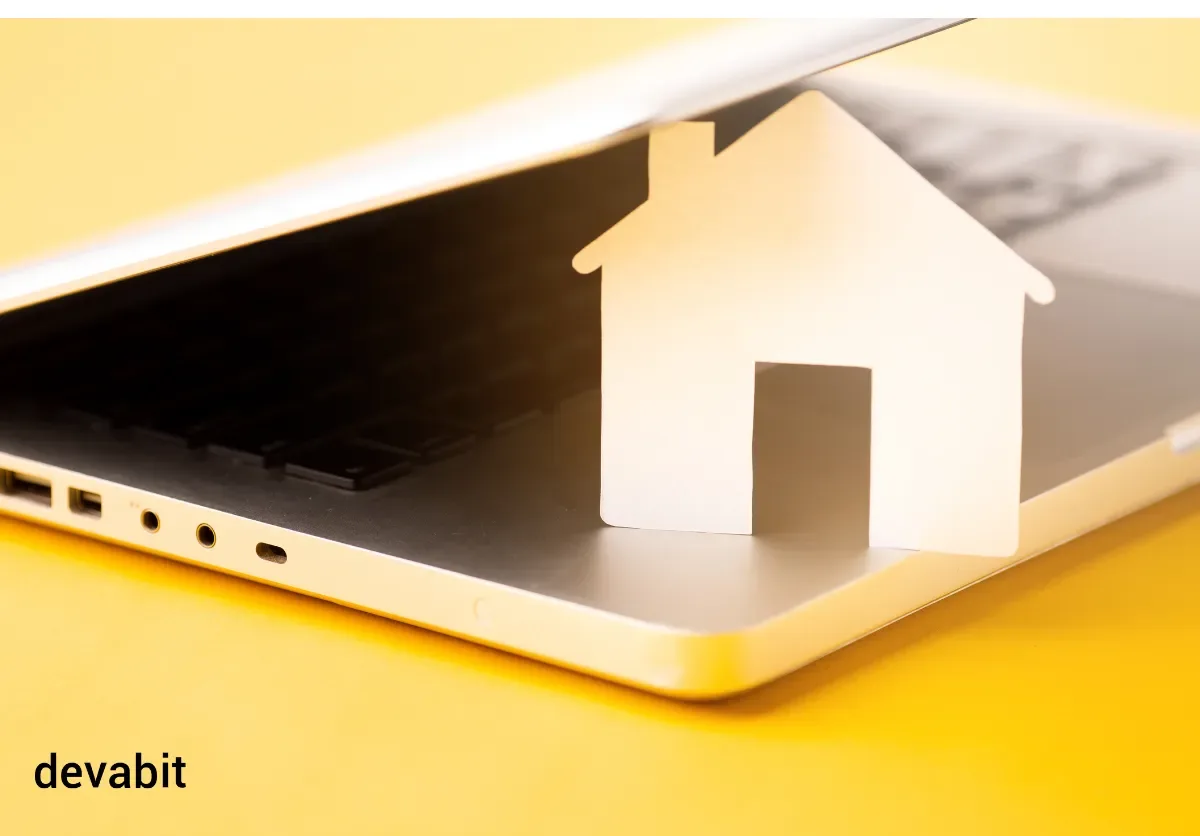
- UI/UX Design: when expecting to reach a wide range of users, it is vital to design with the users in mind. There is nothing more essential than an easy-to-use and human design if you want your real estate platform to be used by all age groups across numerous devices. Pay special attention to color palettes, fonts, accessibility for users with special needs, multi-language and currency support, responsive design, and customizable features.
- Platform Development: and here comes the apogee of your "how to develop a real estate platform?" journey. During this stage, you must ensure a secure and efficient development process among your in-house teams or rely on a trusted outsourcing provider that will handle all the management, security, and quality control headaches on them.
- QA & Testing: before your real estate solution reaches the market, you must ensure it is ready to handle large amounts of data and traffic while maintaining peak performance metrics, instant load times, and an unmistakable user experience. That is why quality assurance (QA) and testing stages are essential. Experienced QA engineers will identify and eliminate potential performance or security breaches before they influence your sensitive reputation.
- Launch & Scaling: congrats on learning how to develop a real estate platform and reaching the deployment stage! But the work is not done... To ensure the smooth launch and flawless performance of your real estate platform while handling the peak number of users, post-launch support and maintenance are the must-haves! Automated or manual security checks, regular updates, demanded scaling up or down, new integrations, and user feedback analysis will help your real estate platform remain sought-after and truly enjoyable for users!
Here is the overview of the main steps you should follow if you want to learn how to develop a real estate platform compatible with your unique business needs, but if you have any questions left, do not hesitate to check out our FAQs section below.
Bonus! Monetization Strategies
Now when you have gained the key insights on how to develop a real estate platform, take a look at the proven monetization strategies to help your solution be profit-making via several channels:
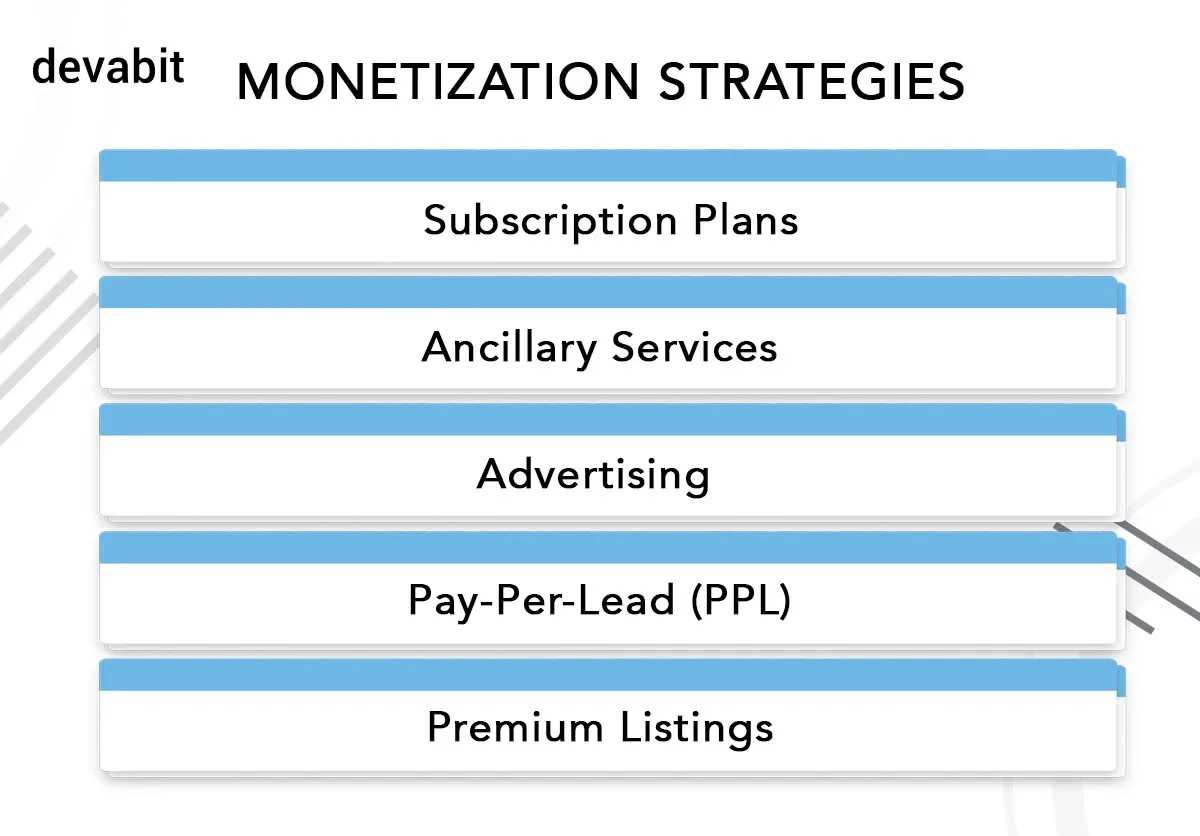
- Subscription Plans: give your users the opportunity to pay for premium services, tools, or features. Important not to limit free-use users but to offer exclusive services for additional payment. It is also a strategic step to offer several subscription plans with a free-use period for reaching a wider audience with different budget opportunities.
- Ancillary Services: being a part of profit-making collaborations, ancillary services can help you monetize eternal tools or services like mortgage calculators, legal document generation, virtual tours, or moving companies. It is a real win-win strategy for both partners, while the user would tend to trust an advised service provider from both sides.
- Advertising: the classic monetization strategy of advertising eternal services or platforms. Vital! It is not recommended to promote services or products with a doubtful reputation or the ones that have nothing to do with your niche. Value your users' time and do not offer something they never expect to see on a real estate platform.
- Pay-Per-Lead: a proven strategy for cooperating with agents or sellers who will pay you for the qualified leads and can help gain more positive user reviews and client trust.
- Premium Listings: help your users promote their properties or services via paid subscriptions and premium listings. The approach generates incremental income from active users and helps your platform close more perfect-match deals.
FAQs on How to Develop a Real Estate Platform with Nick
Just for you, our content writers have asked Nick Dmytriv, a leading designer, to share his best of the best insights on the most frequently asked questions about real estate platform development below.
1. Should I build a niche real estate app for rentals only?
In terms of conquering the real estate industry and standing out among fruitful competitors, it is always better to choose niche real estate app development. And there are several crucial arguments for that vital business decision that we will outline below:
- Choose what you can do best. Before asking yourself: "How to develop a real estate platform?" it is better to start by evaluating your main strengths and weak points in order to have a realistic understanding of your competitive potential. Are you ready to surpass Zillow and offer all-inclusive rental and selling functions? Not really sure? Then, it is better to choose niche real estate platform development, which will actually broaden your opportunity horizons and give you a significant chance to truly stand out among your competitors.
- Assess your budget and timeline opportunities. Be realistic, global real estate app development services require significant global time and resource investments. In case you operate with limited investment potential and want it to break even, you should start to think about how to develop a real estate platform for rentals/selling/mortgaging/promoting only.
- Consider the background. What is the target audience you expect to reach? What geographical regions do you want to cover? Who actually needs your services? Let's take the US real estate industry as an example. Currently, US residents, especially Gen Z consumers, are experiencing a significant affordable property shortage. Combined with a new "rent over buy" philosophy and remote work popularity, this information makes us consider real estate app development for rentals only in order to reach a young, solvent audience ready to utilize your services for frequent residence changes.
Summing up, before moving straight to the real estate app development, give an honest evaluation of the key metrics above and make your final decision if you are really ready for considerable rivalry, vast investments, and loss opportunities. Already made your decision but are stuck on the "how to develop a real estate platform" stage? Our custom development company can help you make your first steps toward remarkable results.
2. Can I build a platform like Zillow or Redfin? What do I need to consider?
Absolutely! However, there are a few vital aspects you must assume before starting enterprise-grade real estate app development, like niche competition, budget requirements, industry regulations, resource demands, must-have features, and a lot more. Though if you want your real estate platform not just to emulate Zillow or Redfin but to outpace them, check this:
- Start with Competitive Analysis. To help you find out how to develop a real estate platform similar to industry leaders, you should evaluate your sample's best strengths and weakest points in order to not just repeat the same mistakes but to create a unique product that will address real user requests. (Checking on user feedback is an absolute goldmine for your further growth!)
- Budget & Resource Evaluation. Certainly, we must understand that enterprise real estate app development services require extensive time and resource investment. If you are not ready to fund high-quality real estate app development, you will never receive high-quality outcomes. In case you are unsure about the realistic budget and time resources required, solid software engineering consulting services can help you get a complete understanding of your success potential within the opportunities and limits you have.
- Compliance with Laws & Regulations. When aiming to develop a global real estate platform, you should ensure your app adheres to numerous industry standards and local regulations in order to reach as large an audience as possible and to be a trustworthy real estate provider. Crucial aspects to include on your "must-have" list are property listing guidelines, user privacy laws, and tax reporting.
- Functional Diversity. Continuing the topic of must-have features of your real estate platform, you must remember that apps like Zillow and Redfin provide their users with a highly competitive list of services like extensive databases, filter searches, calendars, analytics, price calculators, interactive map views, and even more. If you want to stand in one line with real estate ultimates, do not forget to include extensive functional and exclusive options as well.
- Security and Reliability must be the top priorities on your "how to develop a real estate platform" list. From integrating best-in-class cybersecurity coding practices and user data safety to incorporating proactive feedback gathering for ongoing upgrades and scaling.
The bottom line is all about having a realistic understanding of your resource capabilities combined with your unique product vision that will help you find out how to develop a real estate platform, not just like Zillow, but way better.
3. How do I differentiate my real estate platform from competitors?
In order to differentiate your real estate platform and succeed in the web services market, you should follow a few simple yet vital rules in your real estate app development journey. Below, we will review key strategies on how to develop a real estate platform that delivers a unique user experience and addresses real audience demands.
- Niche Positioning paves the way for exceeding a narrower circle of competitors and delivering one-of-a-kind services. In that case, you should start with not just "how to develop a real estate platform?" but with "what exclusive value can my real estate app deliver?" and "what underserved niches can I contribute to?". By asking yourself these simple questions, you will soon come up with a concept of a unique profit-making real estate platform.
- Unique Tooling. In case a niche real estate platform is not really your case, you should consider real estate app development services for incorporating distinctive tools into your basic solution. From virtual property tours and real-time market analytics to interactive renovation calculators and AI-driven chatbots — find out how to develop a real estate platform in your own way.
- UI/UX Focus. When falling for real estate app development services, the first thing you should focus on is not the traffic and even the latest tech trends, but your users. A deep understanding of your target audience's needs and industry weaknesses can help you find out how to develop a real estate platform that addresses real user issues and delivers unique value. Review the competitors' user feedback and find out what pain points your real estate platform can cover and offer even more!
- Trust & Transparency. Never try to build your monetization strategy on unclear pricing models or expired free subscriptions — that approach should be left far in the past. Instead, focus on creating a real estate platform that offers personalized AI-driven pricing, blockchain-based listing, and open data policies.
- Story over Selling. In 2025, branding is all about telling stories and not about selling products or services. Modern customers tend to buy from companies that do not gatekeep and openly demonstrate who stands behind the curtains. Enter the real estate market with a clear message for people in mind, and the users will instantly recognize your real estate platform among the deep sea of similar options.
Taking stock of our advice, competitive real estate app development is all about offering unique solutions to unique problems. Nothing differentiates your real estate platform like personalization and extraordinary approaches do.
4. Should I target one country or go global from the beginning?
When choosing real estate app development services, start with targeting one country first, and here is why:
- Local regulations and laws are easier to comply with. Not every real estate platform is ready to meet all international standards at once.
- Prioritize localized features. Regarding regional real estate specifications, it is better to focus on delivering top-notch services for one or a few areas instead of desperately trying to cover the US and German distinct standards at once.
- Localized partnerships with agents, brokers, or verification partners will help you build industry and user trust from the outset of your real estate platform.
- Marketing aspect. Are you sure you are ready for global investments in global marketing, localization, and translation? For a start, successfully reaching your local target audience is more than enough.
For sure, if going global is your key priority, high-quality real estate app development services will help you go through a thorny path toward international recognition, but be ready to meet new challenges on your way.

5. What are the essential features of a real estate app or website?
The must-have features of a real estate platform usually include:
- Property Search & Filtering;
- Listing Display;
- User Profiles;
- Several Communication Tools;
- Robust UI/UX Design;
- Interactive Maps;
- Mortgage Calculator;
- Push-Notifications;
- Calendar & Scheduling.
These are the essential features the potential users want to see in their ideal real estate platform, but if you want your solution to truly stand out, consider incorporating such characteristics and tools as:
- AI-Driven Recommendations;
- Mobile & Desktop Versions;
- Premium Membership & Subscriptions;
- User Feedback & Testimonials;
- E-Signature;
- Virtual Tours;
- Market Trends.
6. How do I add a mortgage calculator to my platform?
If you build your real estate platform with WordPress, it won't take a while to incorporate a mortgage calculator following these few simple steps:
1. Go to "WordPress Dashboard", then "Plugins", and "Add New";
2. Search for "Mortgage Calculator";
3. Click "Install" and "Activate";
4. Customize settings in "Settings" and "Mortgage Calculator";
5. Use the shortcode provided by the plugin to add the calculator to:
- A property detail page;
- A dedicated mortgage calculator page;
- A sidebar widget.
As a result, you can place the shortcode in your real estate platform like this: [mortgagecalculator].
7. What’s the best way to handle real-time chat between buyers and agents?
When ensuring high-quality real-time communication between buyers and agents via your real estate platform, it is essential to prioritize secure, fast, and responsive communication channels. But how to develop a real estate platform that will combine the best features of top messengers and property listing apps? Take a look at these simple tips that will help you handle real-time chat between your real estate platform users:
- Use Chat APIs like SendBird, CometChat, and Firebase. By incorporating these chat models, you will ensure instant real-time messaging, seen status, image/file attachment, moderation, and communication privacy. The ideal method for those who want to avoid building chat from scratch.
- Use Firebase & Firestore for ensuring real-time syncing, mobile and web versatility, and future-proof scalability as user numbers grow. The basic setup includes three steps:
- Firebase Authentication for user identification;
- Store your chats in Firestore;
- Show new messages using Firestore real-time listeners.
- Build a Custom WebSocket Chat utilizing the top real estate tech stack like Node.js, Laravel WebSocket, and Redis.
8. Can I integrate a 3D virtual tour or AR experience for property viewing?
Absolutely! Adding life-like AR or VR virtual tours for your users can boost your industry success potential and help you differentiate your real estate platform from numerous competitors. Here is a quick break on how to develop a real estate platform that delivers a unique AR & VR experience:
- Use proven 3D tour providers like Matterport, Kuula, EyeSpy360, etc. The vendors will provide you with a detailed 3D tour to upload to your real estate platform, get an embed link, and add it to your property detail page.
- Use WebAR/Mobile AR SDKs for creating interactive AR experiences for your real estate platform users. The most widely used tools include 8thWall, ARKit, Unity, and Zappar. But bear in mind that AR works better with mobile apps, while 3D will go well with both mobile and web.
- Build your own 3D or VR viewer utilizing tech stacks like Three.js, A-Frame, or Babylon.js that will be optimized for both mobile and web real estate platforms.
9. What tech stack do you recommend for building a real estate platform?
When it comes to the question "how to develop a real estate platform that complies with best-in-class industry and tech requirements?", we recommend using the next-gen tech stack like:
- React.js;
- Node.js;
- Next.js;
- Mapbox/Google Maps API;
- Laravel (PHP);
- Django (Python);
- Firebase Auth;
- Docker;
- Vercel/Netlify.
10. What database is best for storing property listings and user profiles?
Among secure and proven real estate platform databases for storing property listings and user profiles, the top options are:
- PostgreSQL: perfect for ample data storage, advanced filtering, and full-stack search options;
- TL;DR: a proven choice for structured listing, location search, and mobile real estate apps;
- MySQL: known for its speed and ease of use while maintaining top scalability levels.
11. How do I make sure the platform is scalable as I grow?
The next question that comes right after "how to develop a real estate platform?" is the urge for future-proof success and scalability guarantee, and here is how you ensure your long-term real estate success:
- Start with choosing a scalable and easy-to-maintain tech stack. By investing in a future-proof base for your real estate platform, you can easily scale the system up and down as your business evolves or the user amount grows without compromising on the solution's performance. The top-tier scalable tech stack for real estate app development includes React (or Next.js) for the frontend, Node.js or Laravel for the backend, and PostgreSQL with PostGIS for a кщигіе and spatially-aware database.
- Next, design for modularity, which means keeping core services like search, listings, messaging, and user management loosely coupled. In perspective, you get the opportunity to swap out the separate components, introduce new features, or even completely rebuild your real estate platform without breaking the entire system.
- Incorporate real-time analytics or even AI-driven analytics to know for sure when it is just the time to scale your real estate platform and never lose the opportunity to meet the demands of a bigger audience.
- Build on scalable hosting for cloud storage features like AWS, Google Cloud, Render, or Railway to ensure your real estate platform is ready for handling, storing, and transmitting any amount of data.
- Turn to post-launch maintenance and support. Whether you go for app development for real estate in-house or decide to outsource real estate app development services to a proven vendor — post-deployment support is the key to your future-proof success. An experienced team of QA experts, manual testers, performance monitoring experts, and cybersecurity providers is the best investment in the scalability of your real estate platform. And it is only up to you to decide whether you seek permanent help or short-term cooperation for a performance boost.

12. Can I build this as a no-code or low-code MVP first?
Yes! In fact, building an MVP or a no-code prototype is a vital step on the way to a competitive real estate app development solution, as that is the best way to quickly validate your concept without extensive investment or too much effort. And here is why and how you should prioritize developing a low- or no-code real estate MVP:
- Fast Time-to-Market: in case you can not wait to see your solution rock the real estate industry, an MVP will help you quickly understand what potential you operate, identify possible pain points, and implement necessary modifications before a single code line is written.
- Investment Test: if you feel unsure about your ROI and are not ready for significant investments into real estate app development, it is better to start with launching an MVP and conducting a thorough analysis of your solution's success potential via user feedback, testers' rates, and performance checks.
- Validate Core Features: let's imagine you seek to incorporate several unique or even experimental features into your real estate solution, which will take significant time and expertise to actually develop. By implementing your core features into a low-code MVP, you will get an opportunity to validate any of your (even inefficient) ideas and bring to the final product only those you find truly worth the investment.
Summing up, building a low-code or no-code MVP on your way to the ideal real estate platform is all about validating any of your craziest ideas and concepts without losing users' trust and your valuable resources.
13. Should I prioritize a mobile app or a responsive website?
Actually... Both! But if you operate a limited budget or timeline scope, you should prioritize a robust website for your real estate solution, and here is why:
- Easier to Launch: when choosing a web real estate platform over an application, you choose a fast time-to-market and simplified development and deployment process. If your key priority is to deliver the solution ASAP — the web real estate platform is exactly what you need.
- Cross-Device Access: a mobile application does have its best strengths, but a web real estate platform will help you reach a wider audience vis device versatility, whether they prefer a quick phone search or a profound laptop investigation.
- Lower Cost: for sure, a limited budget or the desire to optimize development costs are all about web over mobile. There is no need to build several codebases for Android and iOS while prioritizing investment in the overall quality of your solution.
- More Discoverable: if you want your real estate platform to be organically discovered by users without too much advertisement involvement — the web solution can make your real estate platform go fire without a single ad. A well-structured and SEO-optimized website will engage your target audience in the shortest terms.
However, the robust web real estate platform is just the beginning! If you plan to expand and go global over time, then a mobile application is a must-have! There is no need to do everything at once, but praising your loyal audience with a newly-come mobile version of your real estate platform can breathe new life into your business.
14. How much will it cost to develop a real estate platform?
If we are talking about the general price of real estate app development services, the approximate statistics look like this:
- MVP: from $10,000 to $25,000;
- Mid-Size Platform: from $30,000 to $80,000;
- Full-Featured Platform: from $100,000 to $250,000+.
However, the real estate app development cost can significantly vary depending on several key aspects, such as:
- Feature Complexity & Tech Stack: for sure, the price of an all-in-one mobile real estate application with a VR tour integration, payment gateways APIs, and AI chatbots and the development costs of a basic web real estate platform will significantly vary, and that is the first thing to consider when forming the final price.
- Project Scope & Complexity: whether you seek long-term cooperation with an outsourced development team or need initial real estate app development consulting, you will face different budget requirements based on the estimated project complexity and duration.
- Cooperation Approach: when outsourcing, a trusted real estate app development services provider will offer at least a few cooperation models to fit your unique budget ambitions, timeline expectations, and solution demands. The three most common collaboration approaches include the Fixed Cost, the Dedicated Team, and the Time & Material. Your model of choice will directly influence the formation of development pricing and give a clear understanding of upcoming expenses.
- Outsourcing Destination: when you decide to outsource real estate app development services, you dive into the world of outsourcing destinations, opportunities, and diverse price tags. For instance, offshore options like India offer attractive pricing, though can question the quality of your product. Meanwhile, Eastern Europe can provide a perfect balance of quality and affordability. But of course, the US and Australian IT talents will always be the leaders of high-quality services.
Considering the above-mentioned factors, you or your outsourcing partner can form a tangible budget scope and give a transparent overview of your opportunities compared to expenses.
15. How long does it take to launch an MVP?
Even though the required time for launching an MVP is difficult to tell for sure, there is an estimated range like:
- No-Code MVP: 2-4 weeks;
- Custom-Coded MVP: 8-12 weeks;
- Full-Featured MVP: 12-16 weeks. Not to mention that the timelines of your real estate platform MVP launch will also depend on key metrics like UI/UX design demands, tech stack choice, API integrations, features required, development team size, etc.
16. Can I build this with a small team, or do I need a full agency?
Depending on the final outcome you expect to get, the decision between hiring a small in-house team or turning to an experienced outsourcing provider can contrast. But let's take a look at the key questions to ask yourself when you want to understand what team you need.
- What is my project scope? If your project involves launching a low-code MVP for idea validation or building a niche real estate platform — a small team is more than enough to bring your concept to life. However, if your plans include building a scalable real estate platform with third-party tools integration and cross-device frameworks, it will be reasonable to rely on a trusted outsourcing agency.
- Do I need post-launch support? The small in-house team will easily handle the development and launch of a basic real estate solution and even be able to maintain it on a post-deployment stage. Meanwhile, the real estate app development services provider will help you build an enterprise-grade solution and ensure its scalability, safety, and peak performance over time.
- Do I have an in-house team? Before considering real estate app development, you must evaluate your in-house team, if you have one. A clear understanding of your staff expertise will help you understand if you need to extend, scale up or down, outsource, or hire. For instance, your company already has a dedicated team of skilled developers ready to build the solution of your dreams, but have you thought of other vital team members needed to create a polished real estate platform, like UI/UX designers, QA engineers, testers, security experts, etc? In that case, outsourcing may be your perfect option to quickly and affordably scale your team up and receive the desired results.
- Do I seek to save costs? If we weigh hiring a permanent full-stack development team against outsourcing real estate app development services, the latter will always be the more cost-effective option. Instead of wasting tons of resources and time on recruitment, management, and maintenance of in-house staff, you can always come to a trustworthy outsourcing provider with the idea in mind and come out with a scalable, ready-to-launch product.
At the end of the day, the decision to hire an in-house team or to outsource will always be the real debate. However, having a realistic understanding of your project demands, budget ambitions, and timeline opportunities will confer an advantage in making the right choice.
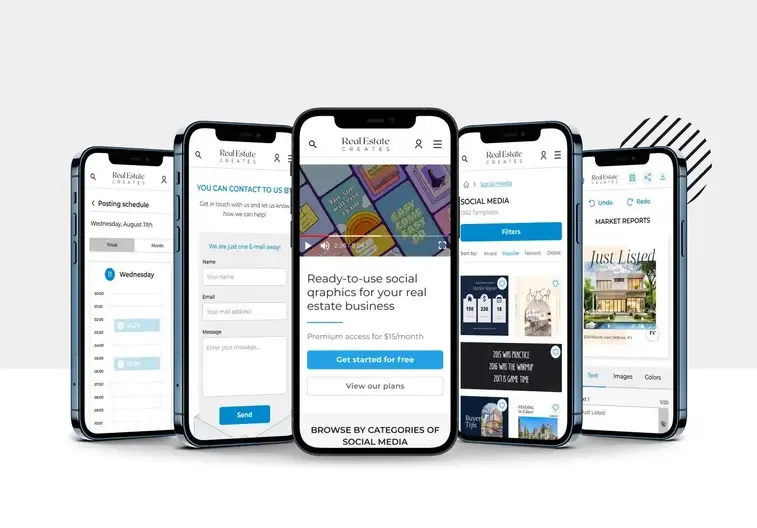
Why Choose devabit?
We hope our guide has helped you to find out how to develop a real estate platform that will comply with your unique vision and top industry standards. In case you seek to outsource real estate app development services or need initial consulting for making your first steps toward the desired outcomes, devabit operates over a decade of profit-making solutions across numerous industries.
Our leading software engineering company can provide you with dedicated teams of developers, QA engineers, testers, UI/UX designers, and other experts ready to work exclusively on your project! Check our services list and see how devabit knows a lot more than just how to develop a real estate platform firsthand. If you want your real estate app development solution to be unique while meeting the desires of a global audience, devabit experts are at your service! Contact Us if you want to discuss opportunities or to find out more about our cross-industry expertise!
Recent Publications
Don't miss out! Click here to stay in touch.
Discover More

Relevant Articles View all categories
View all categories CONNECT WITH US WE’RE READY
TO TALK OPPORTUNITIES
THANK YOU! WE RECEIVED YOUR MESSAGE.
Sorry
something went wrong



